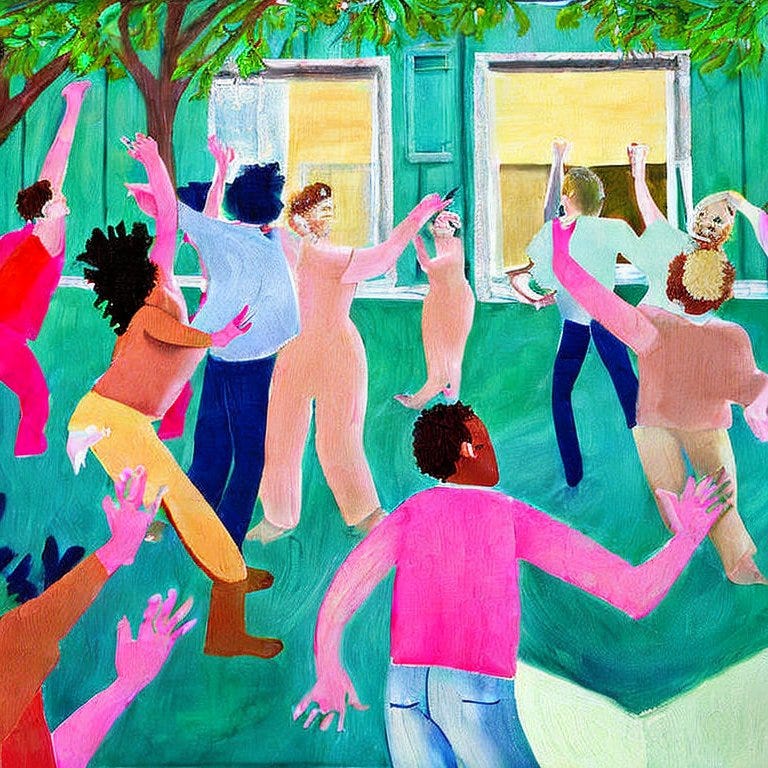Americans Value Country Less but Community More - BCB #60
Also: Intergroup contact can modestly reduce conspiracy thinking, and Utah’s Governor almost said “better conflict.”
Americans value community more than ever
Recently we discussed the decrease in support for traditional American values including religion and patriotism. But what do Americans care about more than they used to? It turns out, hobbies, community activities, and money. The percentage of people saying “community activities” are important to them has increased 23 percent in the last 20 years. This makes it one of the most important values for U.S. adults, and this increase crosses political lines.
This challenges the narrative that people are socializing in person less. Contrary to what might be expected, building community is becoming more important. With Americans valuing religion less, community might be filling that void. Red in particular still values religion; this might explain why Red has a lower increase in importance towards community activities compared to Blue and independents. Despite this, support for “community” has increased for Red more than any other value surveyed.

This seems like good news in itself, and also because stronger community ties can provide resilience against conflict. However, people may still sort themselves into opposing communities.
Intergroup contact can modestly reduce belief in conspiracy theories
If both Red and Blue are riddled with conspiracies, what do we do? Recent research suggests that positive intergroup contact not only reduces prejudices about a group but also can potentially diminish the belief in conspiracy theories.
The study found that high-quality contact with immigrants correlates with decreased belief in conspiracy theories about immigrants, and this pattern also holds in the context of conspiracy theories about Jews. These were both correlations, so a third study tried an experiment: participants who were asked to visualize a friendly encounter with a Jewish person not only developed a more positive outlook towards Jews (an increase of 0.58 on a 7-point scale) but also expressed fewer Jewish conspiracy theories (a decrease of 0.33 on a 7 point scale).
These results suggest that positive intergroup contact can lead to a modest decrease in conspiracy beliefs. Applying these findings to policy-making isn't straightforward. While these effects may appear small, real-world change often takes place gradually and at scale. For example, one could imagine going door to door as with deep canvassing.
Utah’s Governor is fighting for better conflict in the coming election
Utah Governor Spencer Cox wants to save your family dinners. Cox unveiled his new mission to cultivate "healthy conflict" when he took over as chairman of the National Governors Association.
Informed by the latest research on polarization, Cox wants to find ways to curb toxic animosity and cultivate respectful interactions across differing political ideologies. He explains,
I'm not saying you have to engage with someone who is abusive to you in any way. That's not the point of this. The point of this is that most Americans - recent polling has shown that 75 percent of Americans - are tired of the polarization, are tired of the toxic disagreement that we're seeing across our country and are looking for something better.
The initiative promises a variety of actions, including community service projects, recording joint ads with governors from different parties (like this one), hosting college debates, and writing op-eds supporting diversity. Cox's “Disagree Better” campaign (we’re excited by the name) hopes to present a more constructive approach to disagreement. Cox expanded on this in an NPR interview,
We're hoping to provide some counterprogramming to what is likely to be the next most divisive election of our lifetimes as we head into 2024, to give people something else to look at and hopefully to give Americans a little bit of hope that there are at least some of us governors across the country who are trying to do things a little differently.
We are excited to see support for better conflict at this level of politics, but so far it’s not clear exactly what this initiative actually plans to do – what messages will these governors promote, and how will they change their own campaigning? Will Cox be able to turn his words into effective action and actually facilitate better conflict?
Quote of the Week
We find ourselves far too often in this country with false choices, false choices that each side imposes upon us. You can love somebody and disagree with them.








Yes, we need to have more meaningful conversations across all lines- religious, racial, class, political, etc.
The change in the first section is 23 percentage points. That is very different (and a bigger change) than 23%.